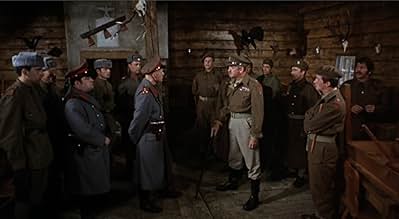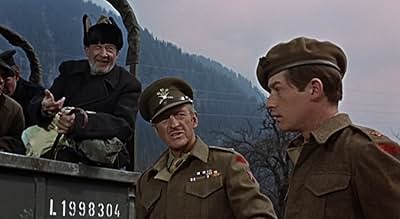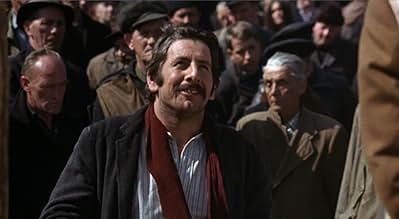IMDb RATING
5.8/10
444
YOUR RATING
After World War II, in an Austrian camp for displaced people, an interpreter mediates between the British and the Soviets regarding the fate of various refugees.After World War II, in an Austrian camp for displaced people, an interpreter mediates between the British and the Soviets regarding the fate of various refugees.After World War II, in an Austrian camp for displaced people, an interpreter mediates between the British and the Soviets regarding the fate of various refugees.
Hana Maria Pravda
- Beata
- (as Hana-Maria Pravda)
- Director
- Writers
- All cast & crew
- Production, box office & more at IMDbPro
Featured reviews
Chaim Topol's career seems to have dwindled into endless revivals of his great role in 'Fiddler on the Roof' (cf Yul Brynner and 'The King and I'). So it's piquant to reconsider his first big break in Hollywood, two years before the film of 'Fiddler' catapulted him to fame.
'Before Winter Comes' highlights the decline of another once-rampant talent, director J. Lee Thompson. It is a mildly diverting entertainment, notable if only for its unusual setting: not World War two but its chaotic and tragic aftermath in four-power-divided Austria, with refugees in camps or roaming the snowy landscape looking for a home.
The centre of the story is an uneasy love/hate liaison. In the blue corner, bored, stiff, combat-nostalgic British senior officer David Niven ('I am nobody's old boy!'). In the red corner, a wily, Schweik-ish ex-Soviet displaced person whose polylinguality recommends him as a go-between when the UK occupying power is trying to co-exist with Stalin's boys as 'firm friends-- friends but firm'.
Niven could by now play a uniformed part asleep, and occasionally seems to have taken that as an order. His career was in low water at the time. It is a quieter part than in most of the ghastly comedies and capers he was doing at the time, but his bland technique is unaltered. Topol is fire to the Briton's ice: winking, grinning, suddenly looking sober and all-business, but how much is sincere and how much the pedlar's spiel? He's adequate, but Zorba-the-Greekishly unidimensional. Perhaps he always wanted to be liked a wee bit too much.
The film begins as lightish comedy, and tries for a change of pace to gravity and Cold War ominousness after Anna Karina insinuates a disturbing element as the love interest. But the gears clash. It looks like an Alistair McLean international adventure with more laughs, sprinkling doughty British thespians generously (Anthony Quayle as a brigadier, an amazingly unravaged John Hurt as a green junior officer) amid the Babel of displacement. Ron Grainer furnishes a whistling-squaddies theme to make you think of 'Bridge on the River Kwai', but the film lacks Lean's dedication to detail in the service of its message. Ultimately any theme deeper than 'Can't we all just get along?' is elusive. Nor is there any 'Great Escape' element to up the suspense.
The script was by Andrew Sinclair, a curious import to movies (Old Etonian, Cambridge academic, author of satirical novels) who sporadically tried to adapt his sour view of Britain to celluloid. The film looks too much 1969 rather than 1945, with Topol heavily hairy and a plethora of flashy zooms from Gilbert Taylor, Thompson's regular collaborator. They had been together, with Quayle, on 'Ice Cold in Alex'... which, alas, shows what a difference eleven years can make.
'Before Winter Comes' highlights the decline of another once-rampant talent, director J. Lee Thompson. It is a mildly diverting entertainment, notable if only for its unusual setting: not World War two but its chaotic and tragic aftermath in four-power-divided Austria, with refugees in camps or roaming the snowy landscape looking for a home.
The centre of the story is an uneasy love/hate liaison. In the blue corner, bored, stiff, combat-nostalgic British senior officer David Niven ('I am nobody's old boy!'). In the red corner, a wily, Schweik-ish ex-Soviet displaced person whose polylinguality recommends him as a go-between when the UK occupying power is trying to co-exist with Stalin's boys as 'firm friends-- friends but firm'.
Niven could by now play a uniformed part asleep, and occasionally seems to have taken that as an order. His career was in low water at the time. It is a quieter part than in most of the ghastly comedies and capers he was doing at the time, but his bland technique is unaltered. Topol is fire to the Briton's ice: winking, grinning, suddenly looking sober and all-business, but how much is sincere and how much the pedlar's spiel? He's adequate, but Zorba-the-Greekishly unidimensional. Perhaps he always wanted to be liked a wee bit too much.
The film begins as lightish comedy, and tries for a change of pace to gravity and Cold War ominousness after Anna Karina insinuates a disturbing element as the love interest. But the gears clash. It looks like an Alistair McLean international adventure with more laughs, sprinkling doughty British thespians generously (Anthony Quayle as a brigadier, an amazingly unravaged John Hurt as a green junior officer) amid the Babel of displacement. Ron Grainer furnishes a whistling-squaddies theme to make you think of 'Bridge on the River Kwai', but the film lacks Lean's dedication to detail in the service of its message. Ultimately any theme deeper than 'Can't we all just get along?' is elusive. Nor is there any 'Great Escape' element to up the suspense.
The script was by Andrew Sinclair, a curious import to movies (Old Etonian, Cambridge academic, author of satirical novels) who sporadically tried to adapt his sour view of Britain to celluloid. The film looks too much 1969 rather than 1945, with Topol heavily hairy and a plethora of flashy zooms from Gilbert Taylor, Thompson's regular collaborator. They had been together, with Quayle, on 'Ice Cold in Alex'... which, alas, shows what a difference eleven years can make.
This isn't really a comedy, despite it's billing in TV guides and some boisterous parts in the first half of the film. It is really a drama that tries to tell a story about different characters trying to make the best of their circumstances, amidst the near-chaos of post-war eastern Europe.
The backdrop and the sub-text of the film is that this is the preamble before the 'winter' of the cold war sets in; an unhappy state of affairs that suits no-one.
There is a fine cast in this film and it is mostly well-made. The camerawork uses a fair amount of the (then novel) zoom lens which is a little distracting, but not as distracting as some hand-held camerawork; an early example of 'shaky camera' for effect. Yeah, we get the point after ten seconds, we don't have to made ill by watching this for several more minutes, do we...?
If asked to criticise the casting and the acting performances, I can't help but think that Niven plays it a bit too straight, and that say, (a younger) Alec Guinness might have done a better job of it. But I am quibbling really; this is a pretty good film, well worth watching.
The backdrop and the sub-text of the film is that this is the preamble before the 'winter' of the cold war sets in; an unhappy state of affairs that suits no-one.
There is a fine cast in this film and it is mostly well-made. The camerawork uses a fair amount of the (then novel) zoom lens which is a little distracting, but not as distracting as some hand-held camerawork; an early example of 'shaky camera' for effect. Yeah, we get the point after ten seconds, we don't have to made ill by watching this for several more minutes, do we...?
If asked to criticise the casting and the acting performances, I can't help but think that Niven plays it a bit too straight, and that say, (a younger) Alec Guinness might have done a better job of it. But I am quibbling really; this is a pretty good film, well worth watching.
David Niven makes a very remarkable performance here as an unwilling soldier in charge of a refugee camp (in the times of 4 million displaced persons in Europe) in Austria, where he has to send many paperless refugees into the Russian zone, where they have nothing good to expect in the days of big brother Stalin. He has a sore past that aches, but as a major in charge he has to stick to his stiff uppper lip, no matter what difficult trials he has to go through again. Topol makes a brilliant performance as the multí-lingual interpreter with many tricks up his sleeve, born in a cart between Tiflis and Tashkent, and he makes the best of it and is thoroughly entertaining, until the bleak reality of no peace after a war sets in, This is really a tragedy of several deep bottoms, and although David Niven is already thoroughly disíllusioned and Topol already is acquainted with the worst and has learned the hard way to survive, John Hurt as the young greenhorn still has his disillusions ahead of him, and they will strike him hard. Fortunately there is Anna Karina for a well needed sort of comfort to all of them.
The film is more serious than it seems, it tries to appear like a comedy, and there certainly are comic ingredients, but the comic gloss cannot hide or smooth over the cruelty of the reality.
Although the dark side of the Stalin regime should have been universally known to the world already after the Stalin trials of 1936, the west was amazingly naïve about Stalin and the true nature of his "communist paradise", as Roosevelt allowed himself to be duped by him and Churchill actually believed in him - until the cold war was a blatant fact, some time after the peace of the second world war, which never really ended but only took on less obvious inhuman activities of darkness.
When the film was released, Columbia booked it as a 2nd feature. Personally, after trying to sit through it, the studio probably should have shelved it, not necessarily for content, but because that use of flashy zooms became so difficult to sit through that I headed for the lobby more than four times.
In this instance zoom meant zooming in - cut - zoom out - zoom in-cut-zoom out all the way through the film.
The use of zoom lenses in motion pictures was a new tool for filmmakers at the time, but its application here made the film impossible to sit through, at least in a theatre. Until now, thought it had all but disappeared forever.
Not sure if time has changed any of this.
In this instance zoom meant zooming in - cut - zoom out - zoom in-cut-zoom out all the way through the film.
The use of zoom lenses in motion pictures was a new tool for filmmakers at the time, but its application here made the film impossible to sit through, at least in a theatre. Until now, thought it had all but disappeared forever.
Not sure if time has changed any of this.
Following the abysmal 'Eye of the Devil' J. Lee Thompson and David Niven have teamed up again for ths film set in a displacement camp. Faced with a veritable Tower of Babel the commanding officer Major Burnside is sorely in need of an interpreter but is sent someone who knows only Ancient Greek and Latin. Luckily he stumbles upon a prisoner who is multi-lingual. Burnside turns a blind eye to his probably being a deserter but then his Russian counterpart starts to ask questions.......
Music can make or mar a film and the score by Ron Grainer is terminally irritating. The scenes between the Cockney and Russkie soldiers are decidedly naff. As for the principals Topol is okay as the interpreter but his appeal has always eluded me. Anna Karina's talent and beauty transcend a thankless role and Anthony Quayle is brilliant as a Brigadier who calls to mind Peter Ustinov's observation that 'the Army is the final repository of the fool'. The film really belongs to Niven. It is not at all unusual to see him in uniform but behind his character's military persona there is a resignation and world-weariness which is very touching. Decidedly one of his best post-Oscar performances. This film should have been better but is alas another of this directors near misses.
Did you know
- TriviaAlysoun Austin's feature-film debut, playing the role of "A.T.S. Driver."
- GoofsThe John Hurt character (Lieutenant Pilkington) has long hair, like John Lennon, not in keeping with British army regulations.
- Quotes
Major Burnside: What languages do you speak?
Janovic: Russian, Polish, Greek, Hungarian, German, Romanian, Bulgar, Serbo-Croat, Romani, Italian, some Arabic, some Yiddish, a little Chinese.
- Crazy creditsOpening credits prologue: OCCUPIED AUSTRIA SPRING, 1945
- How long is Before Winter Comes?Powered by Alexa
Details
- Runtime
- 1h 47m(107 min)
- Aspect ratio
- 1.85 : 1
Contribute to this page
Suggest an edit or add missing content






















